CommUNITY Stories

“About 10 years ago, after I retired, I started feeling that my duty is to look for my father’s documentation when he created the first Vietnamese traditional dress. From the help of the second generation people in Japan, Vietnam, and America, I prepared a documentation about the traditional dress Nguyen Cat Tuong. During the time that I was looking for those documentations, I met many knowledgeable people and they helped me with Vietnamese culture and history. It encourages me to complete my project about my father’s work.”

“I was living in a place where there was no reflection or no inkling of Vietnamese culture or Vietnamese community so I basically, you know, created a new identity and tried to assimilate and adapt to this American identity so that was a very interesting transition. For a long time I didn’t come to realize that my Vietnamese background, who I was, was very important and I need to go back to those roots. I think that was happening later in life so I spent a lot of years, you know, creating or building this identity, which is not a Vietnamese person anymore but someone who came to this country and sort of tried to Americanize myself a little bit.”

“We all grow up really differently with very different experiences. I think the most important will be just to remember that that is where you came from. And I think some people seek it out more, they are more interested in that, you know, finding out about their roots and past. And some aren’t, because they are so wrapped up in you know where they are now. Which is fine, because this is where they grew up and this is what they know. So, I think the parents, or the elders, are probably able to help, you know, remind them of that more. I think that will be important.”

“They should remember, first of all, where they came from, their root. Like it or not, in your blood, you’re still a Vietnamese. Even though you were born here, you were raised here, you live here your whole life, you can carry on whatever you think is good for you, but I’m not going to say I force my kids like my dad and my mom forced us back then because we didn’t have a choice. And that’s how we’ve been raised, not to question. You know, not to discuss anything, not allowed to discuss, not allowed to question. There’s only one way. But here, there’s a different situation, different culture, so you have to accept it make your family life happy and everything, that’s how it works, that’s how it’s supposed to be.”
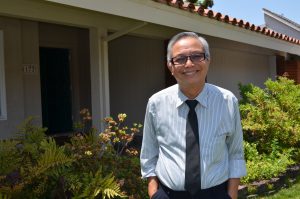
“That was the darkest period for the people in the South. The problems arising from a lack of money, food and medicine, and everything put together created what was the darkest period the South ever had to live through. Upon seeing such scenes, I felt truly disappointed, as the economy fell into a depression. Life became ever darker. We teachers, especially in the literature field, had to cram politics into our lessons, which made us completely miserable and very perplexed on how to prepare our lessons, what they called preparing a syllabus. According to their curriculum, every literature lesson had to include politics. Thus I gradually began to feel like I couldn’t live that way, and I found a way to escape.”
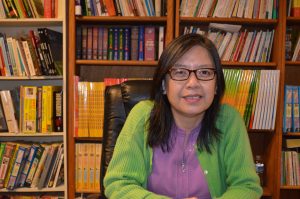
“I was told I needed to burn all the family pictures. I was not happy but I did it. My dad was not home, just my mom. Back then, there were four of us. My youngest brother wasn’t born yet. So I was pretty much in charge, I had to let all the helpers go. We had one cousin who lived with us, she couldn’t come. She had to stay and watch the house, because she was not immediate family, so we could not bring her. My mom told me we needed to burn all the pictures so I was directing my younger brother to burn the pictures. It didn’t even dawn on me why, but I just realized that things were a little chaotic and that we had to leave.”
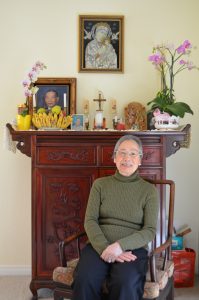
“I lived in the countryside then moved to Hà Nội. We always would go back to Hành Thiện to celebrate the memorial of our ancestors. The most fun was when I was about 5-6 years old, and I followed my grandma to the memorial of our ancestors. The elders were there, and children received a piece of meat and a handful of sweet rice. My village had a festival from the 9th to the 15th of September every year. All the seniors over 60 years old got to sit in hammocks from the communal house of the village to the temple. There was swimming and races, and the seniors had rice cakes and fruits. Each hamlet in the village had their own parade, and it was so much fun celebrating the village’s traditions.”

“The ideal was that I must join the military to protect the South of Vietnam in a defensive manner, and protect it from the invasion of the North. When we graduated from Võ Bị we had a vow: “We do not seek peace and contentment, but desire storms and dangers.” That means we just wanted to go to war without fear of death. We didn’t seek for pleasure and easy life, and we didn’t seek to find a professional career to stay at the home front, but go to war. That was the spirit and courage that came from the heart and self consciousness when we graduated from Võ Bị.”

“We got into a van and we didn’t see our father so obviously we asked him where’s our father and my uncle broke the news to us. I remembered, my mom just collapsed. I didn’t know how to feel, everything was nothing to me anymore because my hopes and dreams was to come over here and meet my father. And then he was gone, what am I supposed to do? I had no friends, I didn’t speak English, and was in a total culture shock. It took me probably a good two years or so to get normal, I guess. But you know, on the flip side, it was supposed to be the happiest day of my life but it turned out to be the saddest day of my life…”

“I don’t know how other people would think if they are in my situation: oldest girl in the family of six and have parents as working people who work hard, try to provide for the family, try to help the kids to attend the best possible school in order to have a better education, a better future. So when I see my father struggle and see him exhausted at the end of the day, I promise myself that my life eventually has to be different. I have to conquer the poverty, at least I will have a better future for myself, but I can also be a better provider for my children or hopefully for future generations.”

“No one could see anything. After that, one of the Viet Cong said, “Now all of you sit there, we have men outside already. Whoever needs to go to the bathroom, go use the toilet or whatever, has to stand up and notify us in order to go use the toilet—you’re not allowed to go anywhere else.” When we slept we had to sleep sitting down, we didn’t have enough blankets or sheets. We had them, but only enough to cover our heads, as there was nothing to tie them together with. That was the first day I was in the jungle.”

“In the middle of the night, they slept in the jungles next to the beach with fear that there were patrols all over the place. My mother was breastfeeding me, and she tells me this vivid story of how they were lying there on the beach amongst the bushes and the ants were coming up and circling her because she was breastfeeding. She couldn’t do anything because any rustling could alert the patrols. To this day, nobody ever told the story about how this one to two year old could possibly be quiet all night long, so I’m still a little confused about how was I so quiet.”
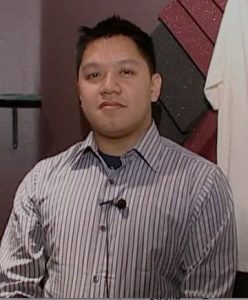
“I went to a private Christian school first, and I was the only Vietnamese person there. At the time, I didn’t really know or understand what being Vietnamese was. My parents just took me along, and we did a lot of the cultural things like Tet Trung Thu. They weren’t as developed at the time, with the Vietnamese community. Growing up, being the only Vietnamese person for a while, was very interesting. People would see me as the Asian perspective, or as their Asian friend. I’d say growing up with mostly people who are of American, English, or Irish descent– it helped me with my English, but I didn’t get much exposure to my Vietnamese identity.”

“After three years in the military, I returned home to teach. I wanted to continue to go to school to further my education so I could be an official professor at the university. I wanted to teach psychology, earn a Master’s. Eventually I wanted to earn a Ph.D., unfortunately in 1975, war broke out. In 1975, those who were in the military or government officials were forced into reeducation camp to brainwash us. But how could you brainwash us, we know what’s wrong and what is right, what makes you think that we will change our ideas? But they knew ways of forcing us to, so I say go on right ahead. They call it a reeducation camp, but it was nothing more than a prison.”
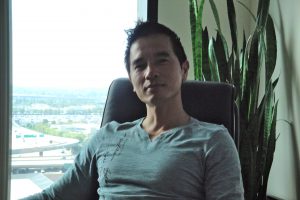
“It took us like a year to finally get out to the boat and leave in the middle of 1978. The family sold everything to get two pieces of gold to give to my cousin to pay to escape. My oldest brother was drafted in the army and it’s dangerous you know. The war was still going on, still expanding to Cambodia and fighting that. So my cousin organized the trip and then we got a discount because one of my cousins was supposed to go, but his family decided not to let him go so I took that role. I took that spot back in 1978.”
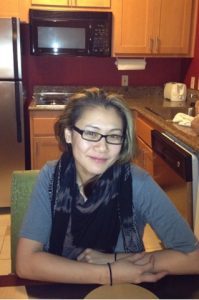
“It was probably really hard on my grandma, who had 11 children. She had to run the whole household by herself and 11 kids. All my aunts and uncles love my grandma because she sacrificed so much for them and they love my grandfather because he was the happy-go-lucky one. I’m sure he was stressed as well, but he didn’t have the same hardships as my grandma. Our family is very Anti-Communist and we blame everything on the Viet Cong. They had to sell everything. They escaped to come here. We wouldn’t have the same opportunities in Vietnam like we would have over here.”
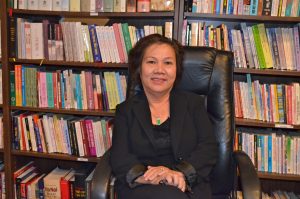
“At that time, we knew we were going to Hongkong. When we got halfway there, the engine shut off, and the vessel kept floating. We called for help all over the place, but did not see any ships. Until the afternoon, there was a vessel. The people on that vessel said that they were in Macao trading. They said we had to pay them 60 taels immediately for them to pull our ship to Hongkong. By then whoever had a ring took off their ring, so it was enough. Afterward, that vessel came out and agreed. They came, got the cash, then went to Hongkong.”

“When we stayed in Guam, they treated us very nicely, fed us well, and brought us to places for sight-seeing. Life was very comfortable. Our lives turned even better once they moved us to Camp Pendleton. I ran into my former comrades-in-arms, and we would gather together to pass the time away. We only started worrying when we were allowed to venture outside of the security zone. We started wondering about what we could do to survive out there. We spoke little English, and our only experience in the military was to shoot the guns. We had trouble finding work at the beginning. Eventually, things got better and works came by easier as time went by.”
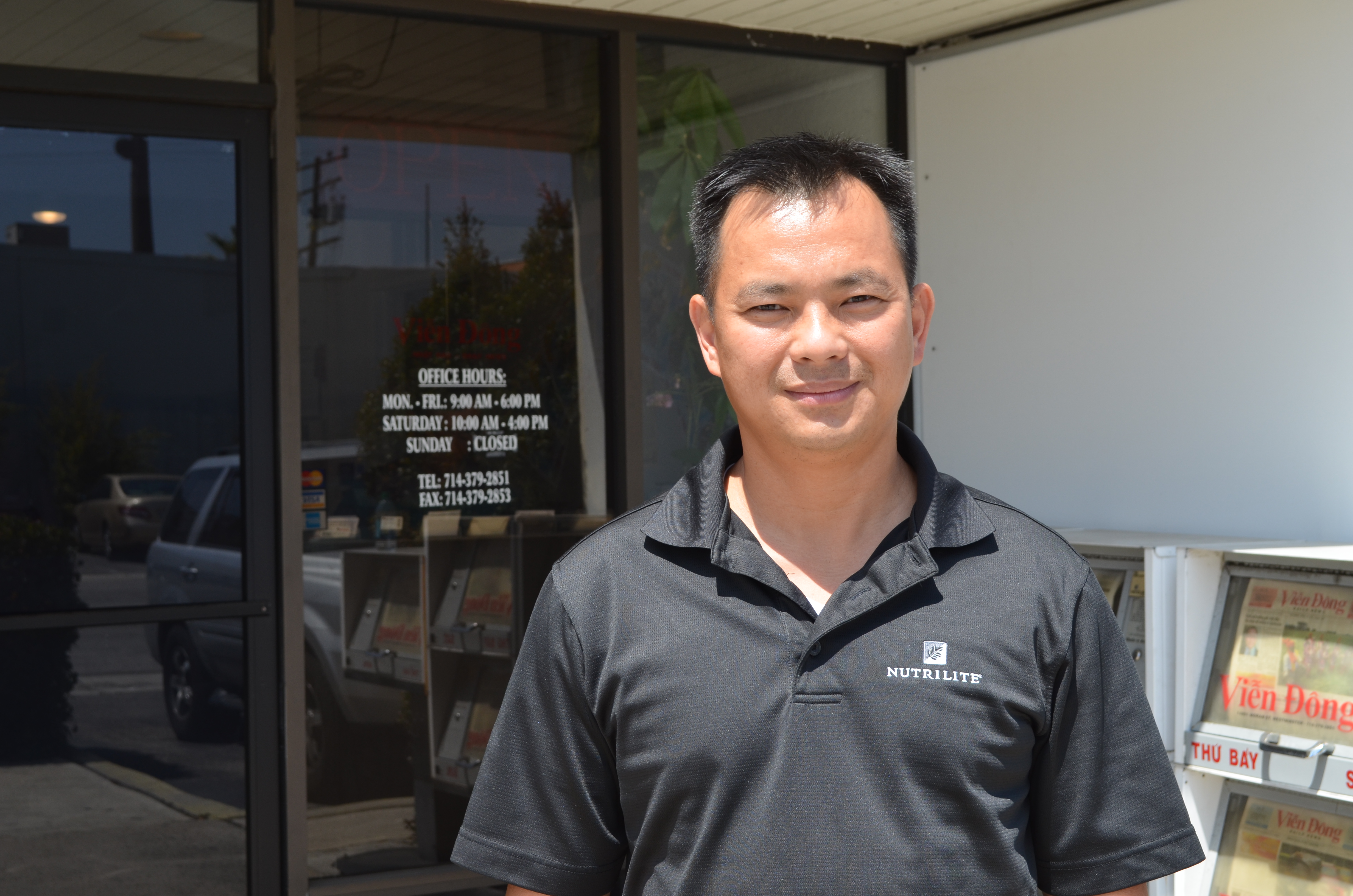
“Life was hard after 1975. My father was sent away, so my mother was forced to find something to do in order to feed her seven children. My father came out of the reeducation camp and saw that there was no future for us, not to mention we, the youngsters, were about the age to be drafted into the army. We decided we must escape. I was having a good time around my friends, and now had to sneak down this boat to leave all behind. Sometimes I felt sad thinking of them and those times we had together while I was in the refugee camp.”
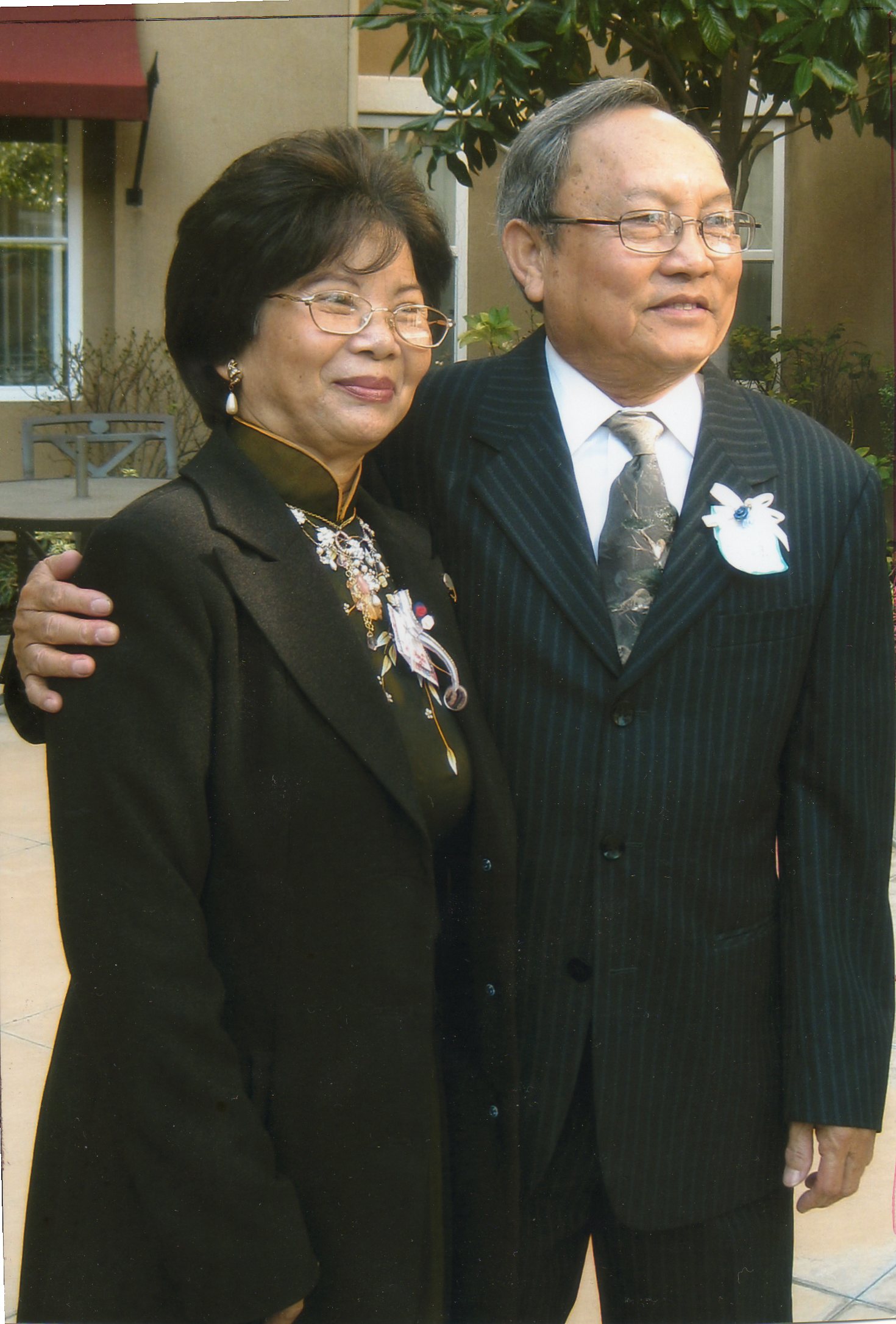
“A quarter or a fifth of the people was already dead on the street. The weather was horrible; it was raining and there were huge waves. When we got to Vung Tau, there was a large shipping boat. It could hold five to six thousand people, but there was no engine inside. We climbed in and lived in there. Inside, people were hungry, thirsty, and cold. There was nothing, not even a roof. It was raining, windy, and people were getting sick. They said that there was an American ship that was going to tow them away. We waited days until the American ship came.”
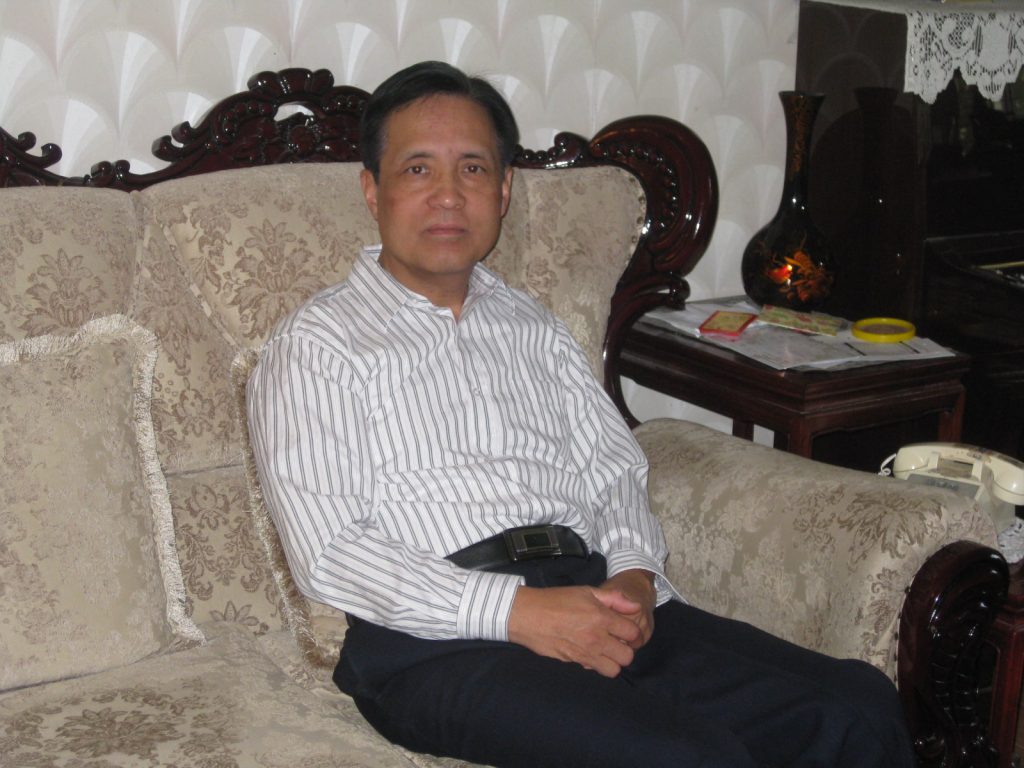
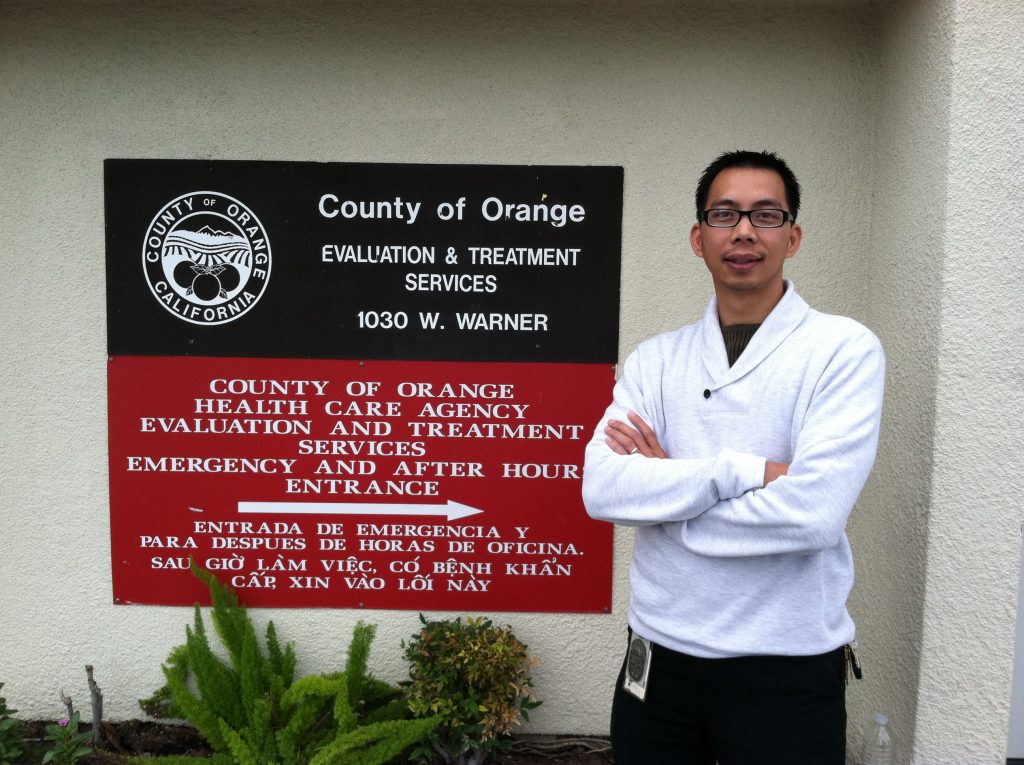

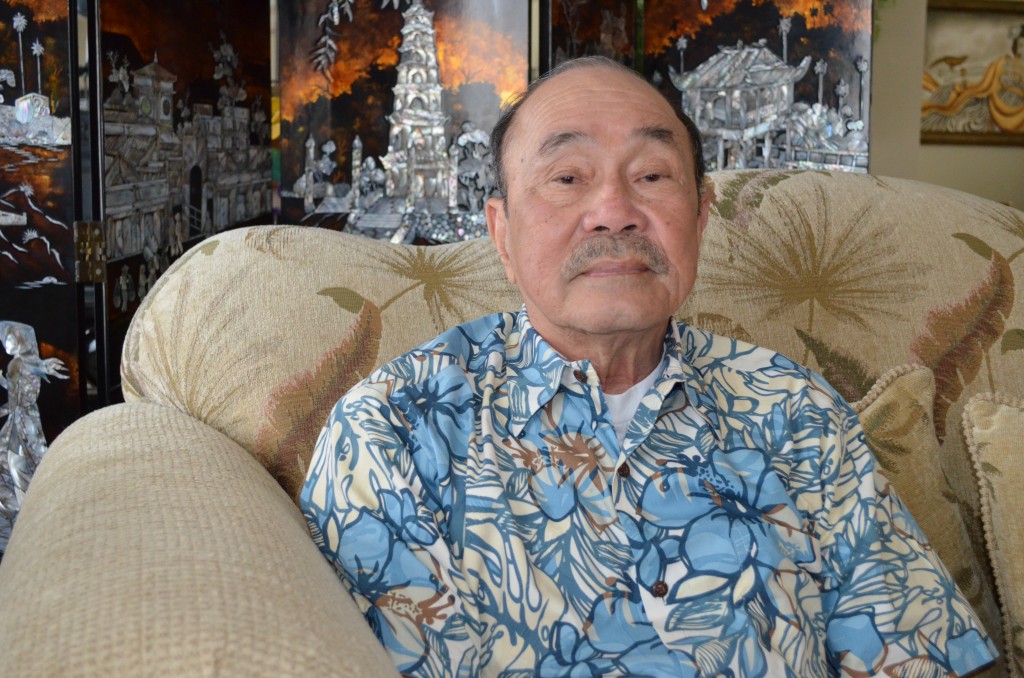
“Sometimes, I remember the war. I remember seeing too many American fire jets in the sky. At that time, I was a little boy; I sat there and saw the American airplanes attack the target in North Vietnam. I saw the missile of the gun they fired with the fire jet. It was terrible. One time in 1972, on the last day of American bombing, I saw in the sky a lot of fire as if it was the daytime. Then, a lot of American airplanes fell down. Too many people died because of the bombing. I never forgot this memory.”
“I still remember that night when we were all carrying our luggage and walking from my village to the main street. We went from bush to bush so that we wouldn’t get seen escaping. Then we were instructed to go to the next village where the boat is waiting to escape. Every village has a gate that we had to go through, and at every gate, there were government officials watching and guarding. If they ask us where we were going and why we have luggage, we were to say that we are from outside, from a different kind of village and we’re visiting family members. I remember telling them that and making it through.”
“The communists saw us and they fired their guns. They shot us, but luckily our boat was very fast. When my dad planned to escape, he already planned everything. He bought the gun, and he bought the grenade. When we escaped Vietnam, we saw the communists chasing us, and my dad threw the grenade to the ship. They saw that we a gun and that’s why they turned around and went back. We kept going, but on the way, we encountered pirates. Luckily, they only stole money, and nobody had been beaten or raped. It took us seven days on the sea to get to Thailand.”
“These days in the south we’ve seen so much rebuilding going on over just a short period of time with the united nations help, causing some people to ask why they couldn’t do that before, but how could we with landmines and bombs killing students, there was no way. Now that things are peaceful it can be done. But actually it doesn’t benefit the Vietnamese people all that much, hunger is still increasing day by day. Vietnamese girls are sold off here and there, which is so tragic, many people cannot achieve their goals, the United States abandoned them, and China is eyeing Vietnam. There is nothing we can do.”

“We were very lucky because my mom was a businesswoman. She knew education was very important, so she tried her best to create her own business.. so we were very lucky. We finished high school in Vietnam. However, in Vietnam, they also believed that the girls didn’t need to have much education. After high school, you were done and you got married, and then you create your own life. They all believed this in my family except for my mom. My mom didn’t think that way. She believed that girls should still pursue higher education. That’s why we finished high school there, and then I continued college in United States.”
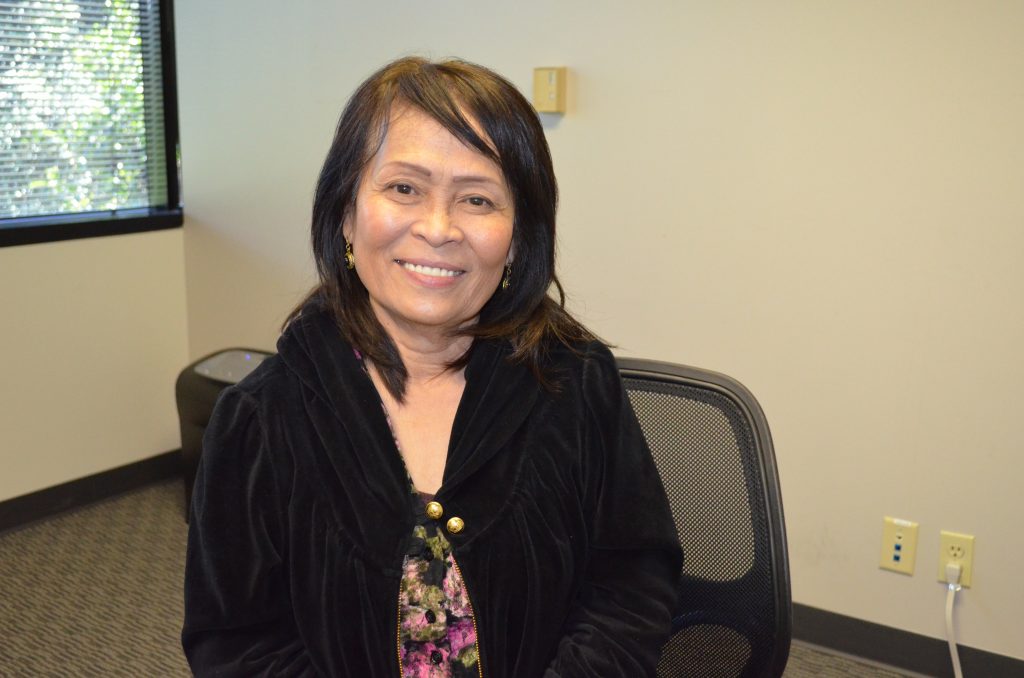
“They wanted to continue to move out of there because the Vietnamese Communists stopped them in each station along their way. I had to leave and I still saw my students went to school on my way, but I had to go. My husband refused to go and said that he needed to be there to get ready for the battle. He could not leave like that. I went with my two children and my in-law family. My older sister rented a small boat to go together. Our life was like a tiny thread on the bell which was deemed and unknown. I never thought of escaping like this, our boat was like a little leaf floating on the ocean, we only saw the death end with no sign of life, not even knew where we were going. We were not even known our way around, after two days we finally ended up in Vũng Tàu.”
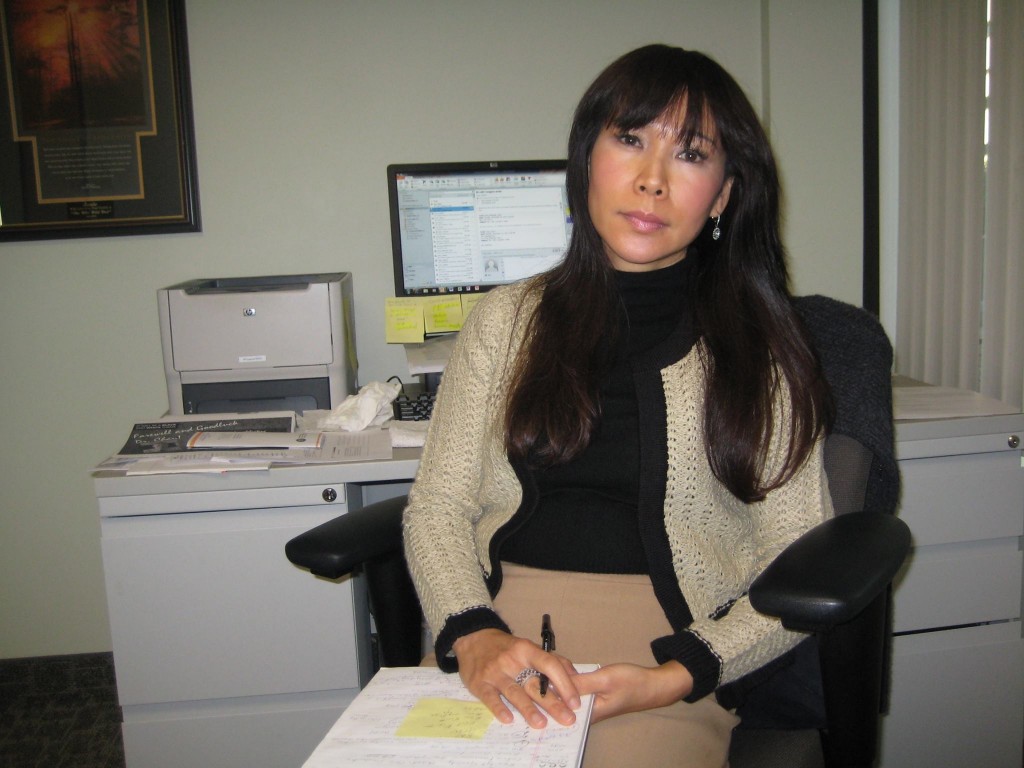
“So I left Vietnam in 1983, I came to the refugee camp and of course, you know, as a younger woman without family, I was subjected to sexual harassment, sexual abuse and things like that. There were several incidents but I am not going to share here. I overcame that, but it did take a toll on me, it really did take a toll on me. After the escape experience and after the experience of living without and coming to another country without family, I always had to do everything I could to be accepted by other people.”
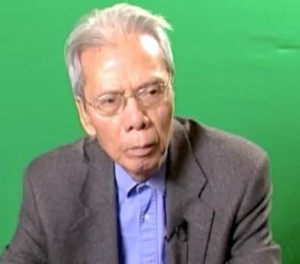
“There were 6 executioners standing only a few feet away from the prisoner. They pulled out their hand guns and shot him in the chest. Then they cut him down, pushed the body into the hole on the ground with no coffin what-so-ever, and buried him just like that. The ground on the grave was flattened down, instead of piling the dirt high into a recognizable grave. Scenarios like that happened everywhere in the North that year. Those who were a bit well off already left for the South. The rich and wealthy, they had gone south too. The landowner class in the North was not as rich as their Southern counterpart in reality. Even so, they packed up and left.”

“My first encounter with racism was in junior high school. It was in my geography class, and I had just started my first semester in junior high school in the US. It was very difficult because it’s geography, and I didn’t know any English, but I studied so hard and it was a multiple choice test, I believe, so I did well. And I ended up getting a B on the test. There was this African American kid who sat behind me. He failed the test and I think he was a little embarrassed. He was upset and then he pull my hair… I turned around and he said, “You stupid Vietnamese, go back to Vietnam.”
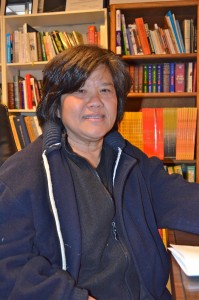
“Monday was the 29th; we lost the war on the 30th. We left for the airport on the 29th and those who were left behind just cried their eyes out.. A fight broke out on the bus on the 29th too. Can you imagine there was a big crowd about 100 people waiting there? They locked the doors, and only those who had the passes could enter and board the bus.I remember someone pulling my hair. Then, the 2nd bus arrived. My father told me to stop fighting and move on to the 2nd bus, which was the one I rode on. On the way to the airport, I heard a rocket explosion, very close to our buses. I didn’t see any dead bodies, but debris flied everywhere.”

“But that was a full-time job…I was doing well in school during my first 2 years and in Vietnam, so when I transferred to a semi-public school, everything was easy— math was easy; English was easy, and everything else was easy. I also learned French but when I went to work full-time, my learning abilities dropped..they dropped; I only received Cs; from an A to C. However, I still tried to work because I knew that it would help my parents and my siblings have a better life. After we had moved to California, I continued to work.”

“I really missed my grandma because she couldn’t come with us. My father sponsored my mom and me but my grandmother had to stay behind so I really missed her. But I was really looking forward to the United States you know? I hadn’t seen my dad for a while. I mean, ever since I was a child so I was very excited about that. But also very apprehensive because I didn’t know English at the time. So basically it was going to be from scratch…“
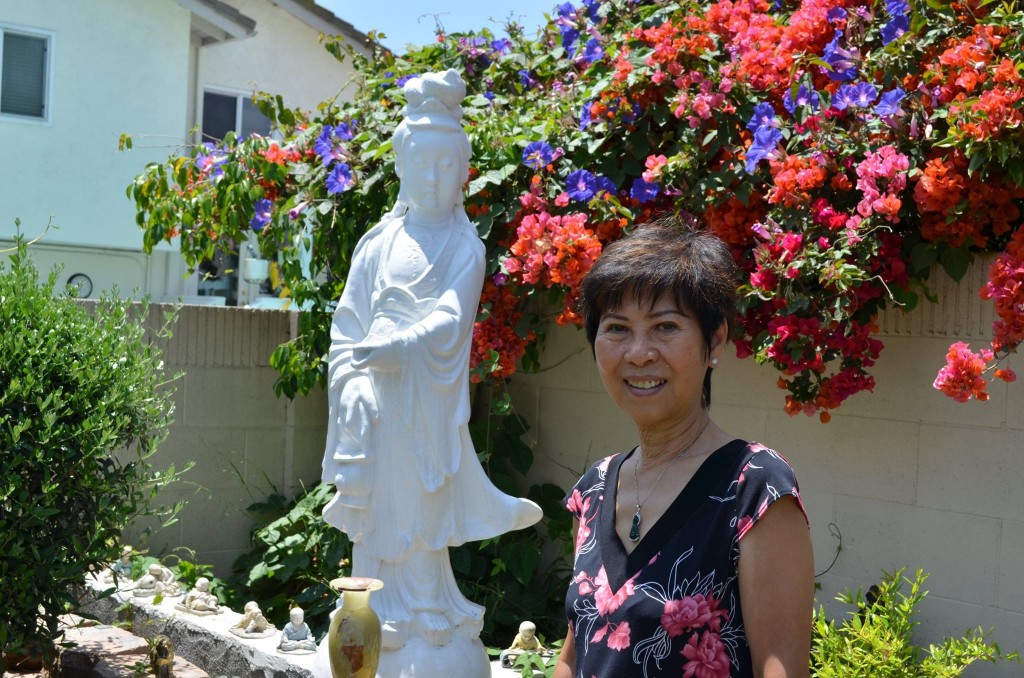
“At the beginning, I was so confused because I did not know anything. When my husband was sponsored out of the camp, he was depressed all the time. He worked all day long. He was used to the afternoon nap back in Vietnam, so he skipped meals during lunch time to sleep in the car. After work he would go home, go out to the beach and sit there crying. We were living near Santa Cruz at the time. I felt so desperate seeing him like that. I did not know what to do while my tummy was getting bigger everyday…

“After that, we stayed at Camp Jubilee. Every day they would give us a bowl of rice. Our bodies after a period of starving would demand more nutrition than usual. We would feel hungry a short while after just being fed. Yet they only feed us a bowl of rice a day. Those who came from Da Nang or Hai Phong, they got help from their compatriots who came to the camp ahead of them. We, who came from Saigon, knew no one, thus we were pretty much alone and without any help. We begged for left over rice from others who had other sources of foods that they could spare us some of their left over rice.”
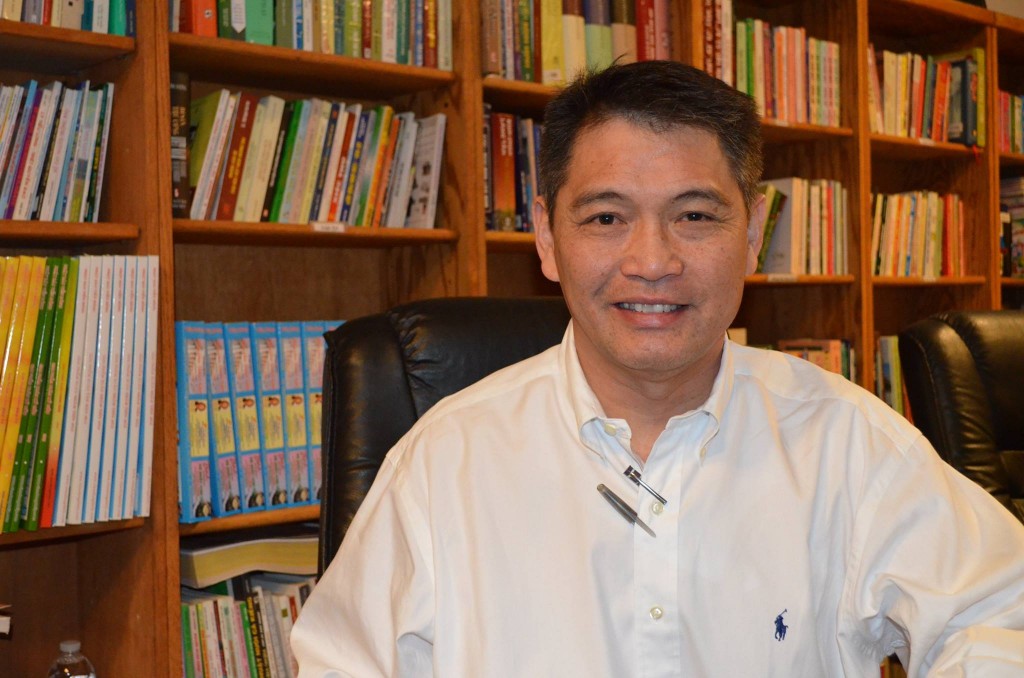
“They came right on the April 30, 1974. Here comes the bombs dropping on us, exactly where we stayed because we’re right next to the military base. So it wasn’t safe after all. We all got under the safe tunnel. I guess back then every house, even my house, had a safe tunnel, a hidden tunnel. We get down there, to stay away from the bombs. It was the first time, the first experience in my life: the terror of war. You’re holding on for dear life. Kids were crying. I was crying. Everyone’s crying. ”
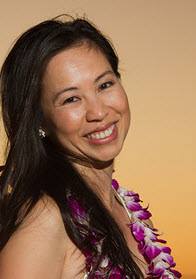
“I can’t really remember anything except for the night where my family, in the middle of the night, got us up, “we have gotta to go”,
and I said, “Where are we going?” I had no idea but I remember my uncle, you know, put me on his back and we just ran through the forest and I was half asleep and I had a pair of pajamas on me and I was holding it really tight.I held on his neck because he was just moving alongand when asked where are we going, no one explained…”
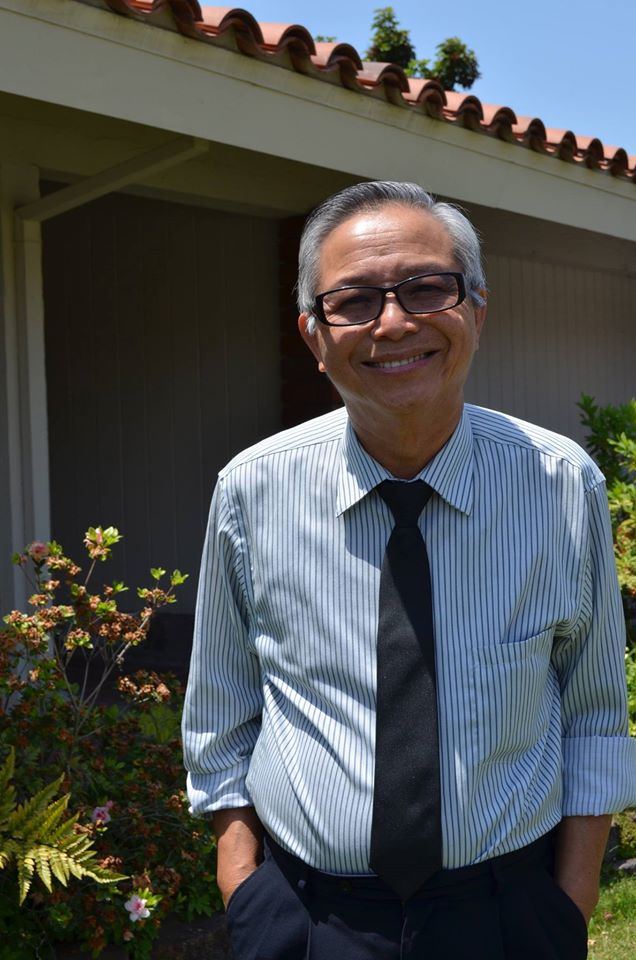
“It was a nightmare! That was the darkest period for the people in the South. The problems arising from a lack of money, food and medicine, and everything put together created what was the darkest period the South ever had to live through. And that’s not to mention the issue of ideology, they crammed politics (into us), and then there was one thing that really discouraged us…Right in Dalat city specifically there were several people who over-zealous in their support of the liberation forces, they manipulated and sacrificed their own friendships. Upon seeing such scenes I felt truly disappointed, as the economy fell into a depression.”
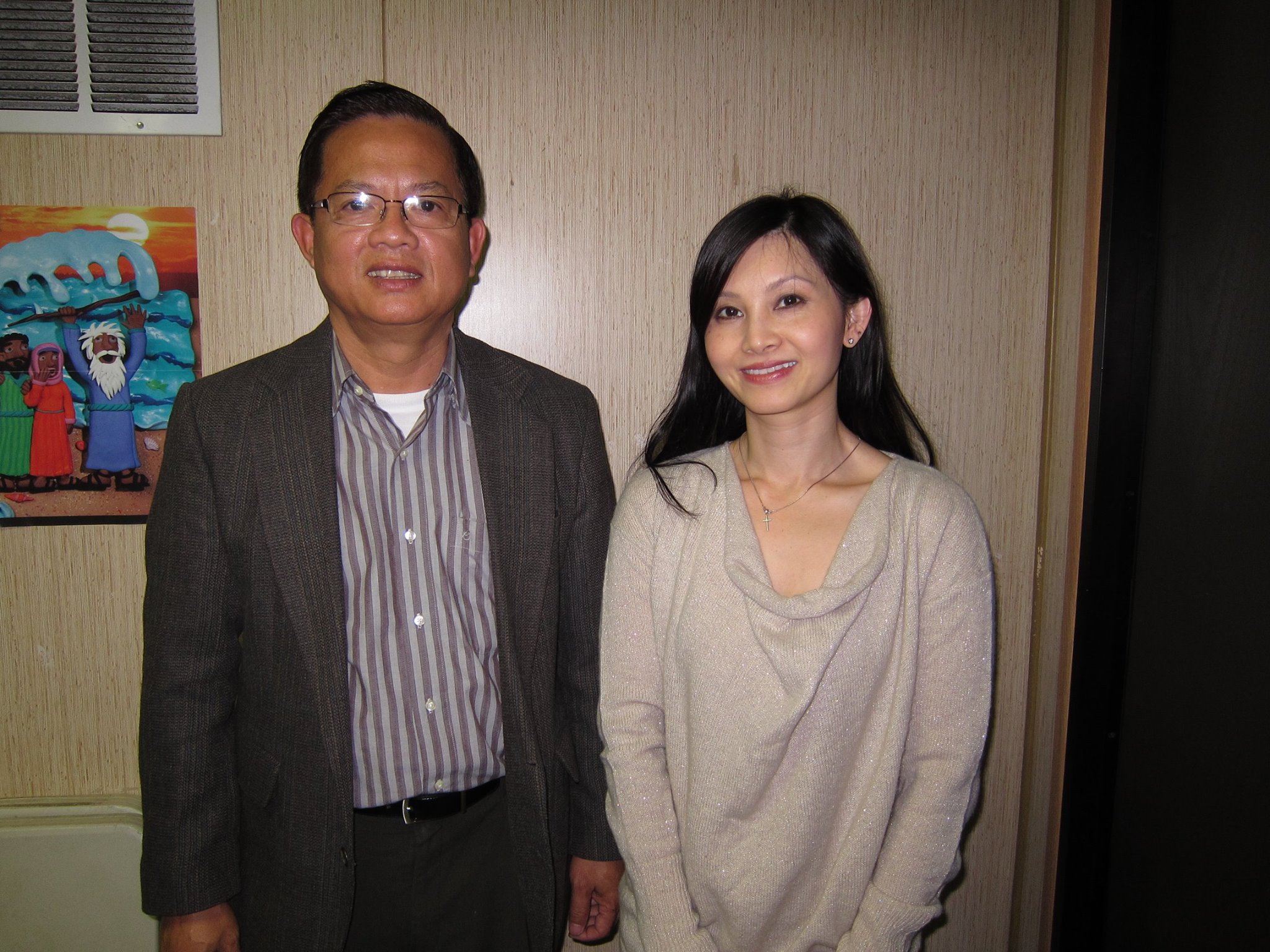
“I came to America leaving my wife and children behind in Vietnam. My perspective of Americans is very personal, because when I was still living in Da Nang, I was under the mentorship of many Vietnamese missionaries…Near home, there were many American teachers whom I would socialize with. As a Christian, I understand the American culture. So I was not a stranger on American soil. I was just missing my children back home, and was hoping that I would reunite with them very soon. ”
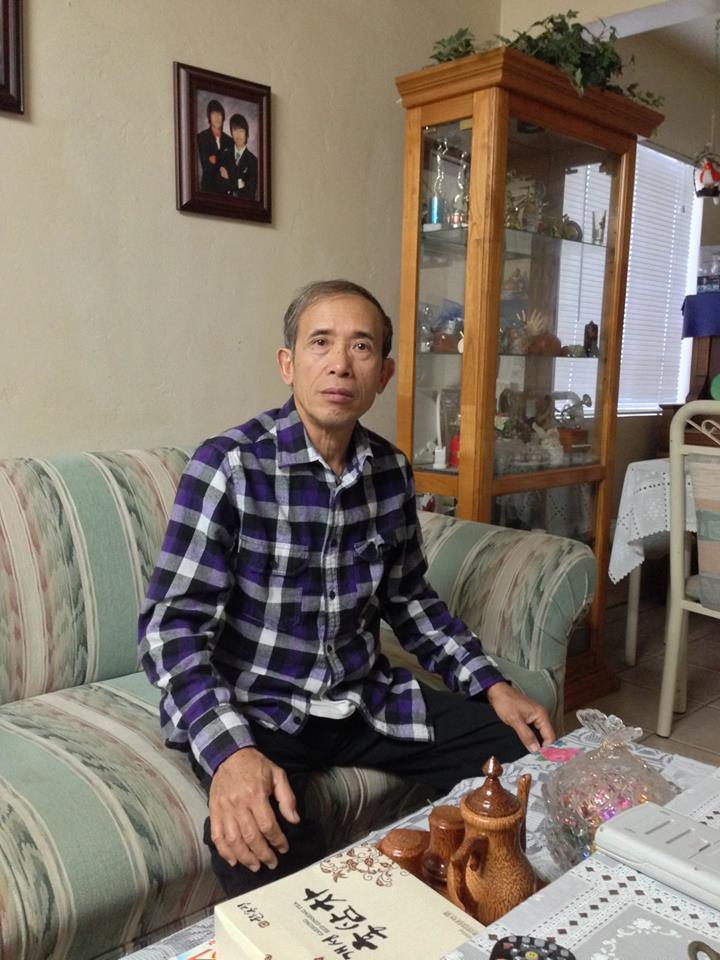
“Of course I’ve been through a lot – eating very little, getting sick and having no medicine, working very, very hard. I didn’t have enough to eat and no medicine at all. There are a lot of things that I suffered from while in prison. But one thing that affected me the most and was unreasonable for a human-being’s thought and sense. The thing that was so contradicting to human rights. It was the doctrine that they taught me, which I had to know with all my heart. I was so angry but I was not be able to do anything. This was what made me suffered the most.”
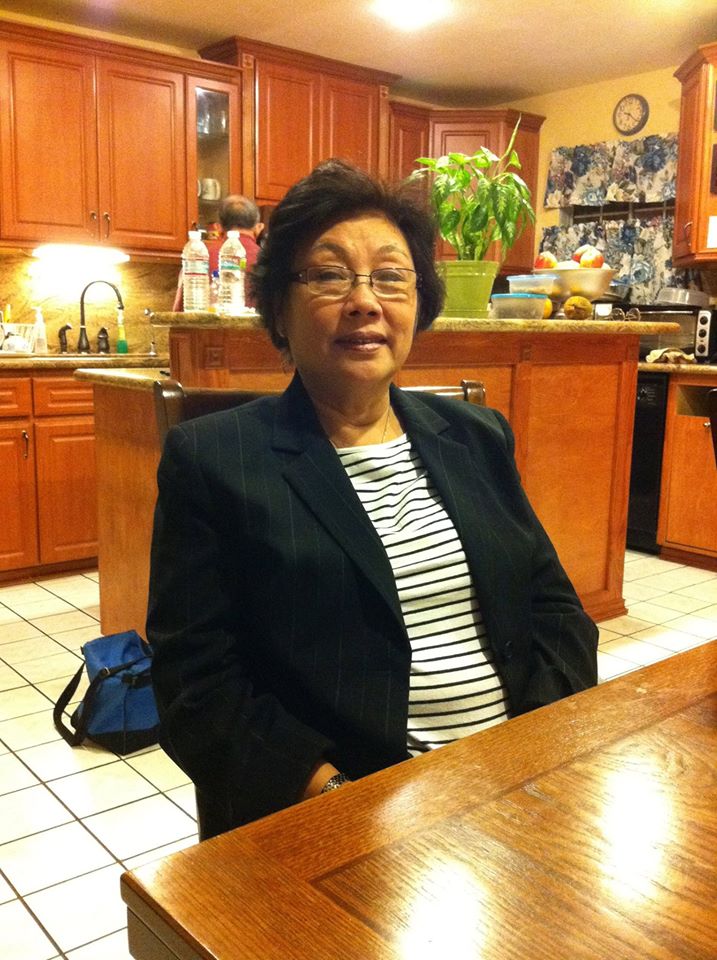
“After April 30,1975, they took over the whole city and they controlled everything. They came to our house and search for our money. They search our property. They search though our jewelry. They search for anything good that we had and they would take it away. They don’t let you have any freedom, about 4 people stayed at my house and they record everything. What we do, what we eating, what we have in the business, what my husband is doing, what I’m doing, what my kids are doing, they try to control everybody and they report it. They keep a record of everything and they make everybody feel so uncomfortable. We were scared of them; we didn’t know what they’re going to do. One night, they brought a truck over and took everyone in my neighbors family in the truck and took them away. They drove to the countryside and they threw them in the forest. We had to do whatever it was to survive and because I have so many kids, I had to be nice to them and follow their rules so we can survive.”
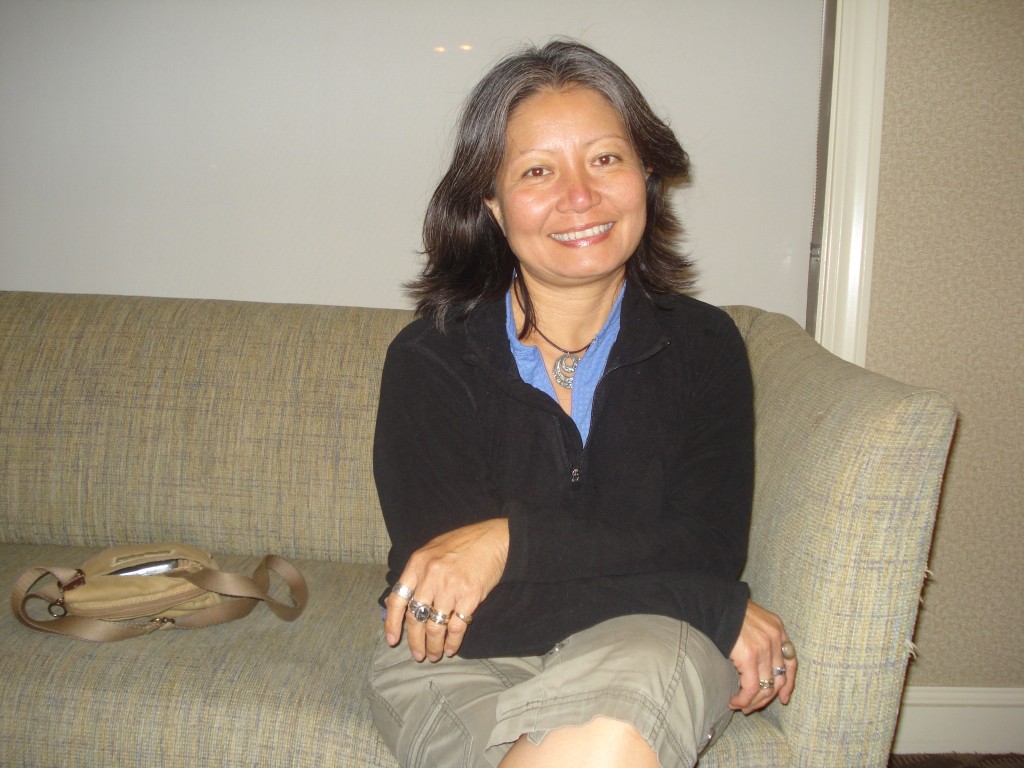
“We pretty much lost everything and I know it was really hard on my parents but I think they were just so focused on making it work and trying to put food on the table. At least from my memory, they’re just very forward thinking people and they remember the past but yet they want to make it work. So they work really hard to take care of the six children, my grandmother, her two sisters, my mom’s two sisters. We were living in a house with eleven of us and we were privileged before but it’s all changed…”

“I had to be self reliant. Any situation that I faced, I had to remain undaunted, I had to try whatever way it took to follow my aspirations. When I started to paint I knew for sure that I had to become a painter even though my parents told me that occupation didn’t make money. My brother established a career working in electronics, but I told my parents I knew what I wanted, so I was going to stick with it and see it through. When I left the army I was still able to do it. I accomplished what I had wanted to do.”

“We came out of the airport and it was completely different. My uncle lived an apartment at the time, a small one bedroom apartment. The four of us, my family, we slept on the floor in the living room. It was all good, I mean it wasn’t great but—it just, you know we all shared that. I think most refugees who came America feels very depressed at first. Our expectation were too high because we didn’t know what it was like over here… ”
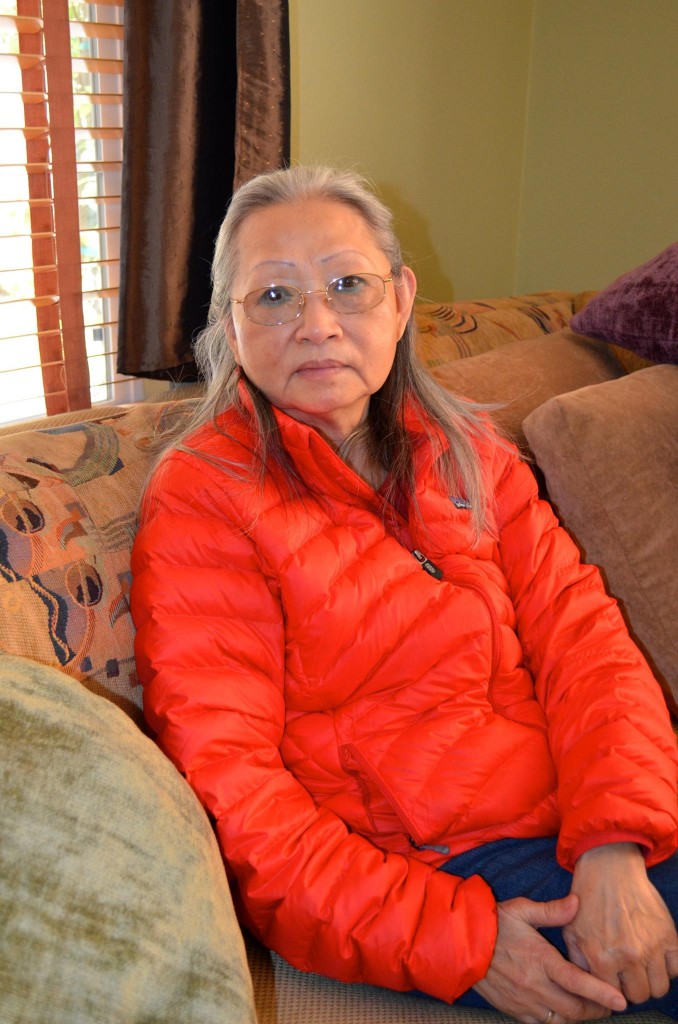
“Life in America was miserable because there was no governmental support. Applying for jobs and would return nothing. They didn’t accept my husband to be a carpenter. Afterward, they sent us to learn English, thus giving a few hundred dollars a month to live on. Then, I read in the newspaper a position working for a photographic studio. I brought my husband there because he couldn’t speak a lot of English. His listening and reading skills were adequate, but his speaking was not. His pronunciation was incorrect thus making his words incomprehensible. I got him a job working in the dark room, processing black and white pictures. Meanwhile, I returned to study by enrolling myself at Cypress College.”
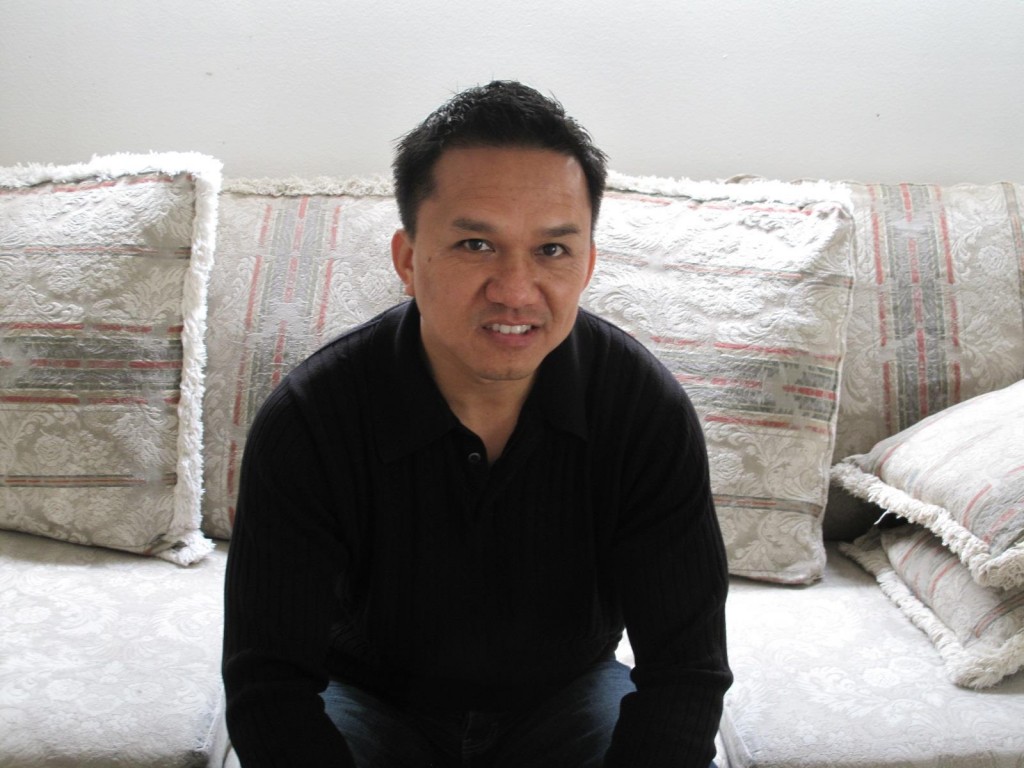
“We got here on March 26, and my father passed away. He passed away here and we had no idea because my uncle didn’t want to tell us until we got to San Francisco. We got into a van and we didn’t see our father so obviously we asked him where’s our father and my uncle broke the news to us. I remembered, my mom just collapsed. And I just felt like… I didn’t know how to feel, everything was nothing to me anymore because my hopes and dreams was to come over here and meet my father. And then he was gone, what am I supposed to do? I had no friends, I didn’t speak English, and was in a total culture shock. But you know, they say time heals, and it did. It took me probably a good two years or so to get normal, I guess. But you know, on the flip side, it was supposed to be the happiest day of my life but it turned out to be the saddest day of my life…”

“After 1975 when the life suddenly changed since the regime of the North Communist Vietnamese took over the South, I started to taste what the hard life was. Every night they reminded us that they were the winner of the war and your father in America was the cause of the war, so you had to pay the price for your father. Not only me but my mother had to suffer that, too. Every night they called her up for town meeting, and they made sure to brain wash her. They said that she had to be a model woman for others because she had a son related to people who caused the war and bad society in the country. “
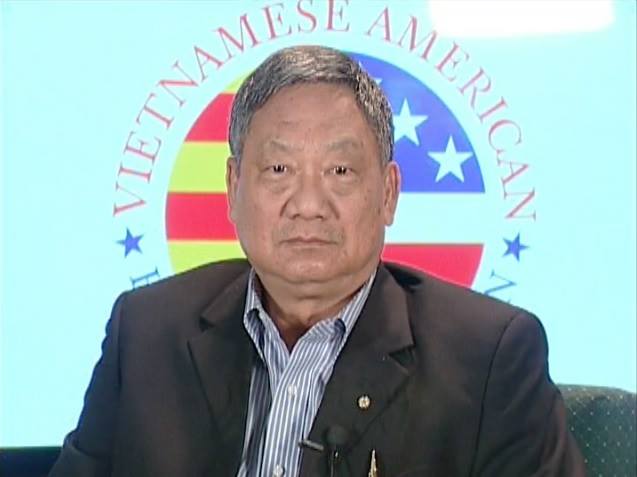
“During the Mau Thuan combat, our house was bombed and burned, so my parents took us to stay in Vung Tau where my aunt, my mother’s older sister lived. During the time we stayed there, because my family was poor I was very sad. So I went to Saigon to study for a while and took a test to enter college again, but I failed. I was so sad about it, and so even though I wasn’t old enough to join the army, I volunteered to do so anyways. That was just a way to get out at that moment.”
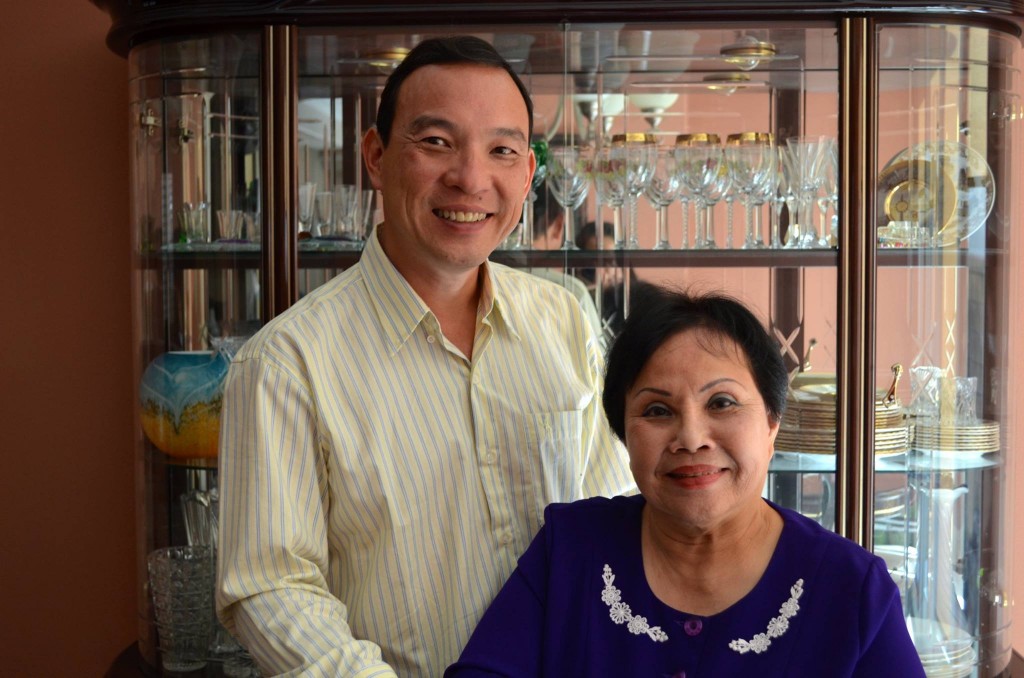
“We all stayed together. When we slept together, my brother, sister and me; we slept in one big mosquito net. I remember waking up in the middle of the night and I would see my mom either crying or trying to kill the mosquitos in the net. My grandfather, my mom’s father, helped us out a lot because we were so poor back then we didn’t even have enough food to eat. That memory has stuck with me for many years. ”
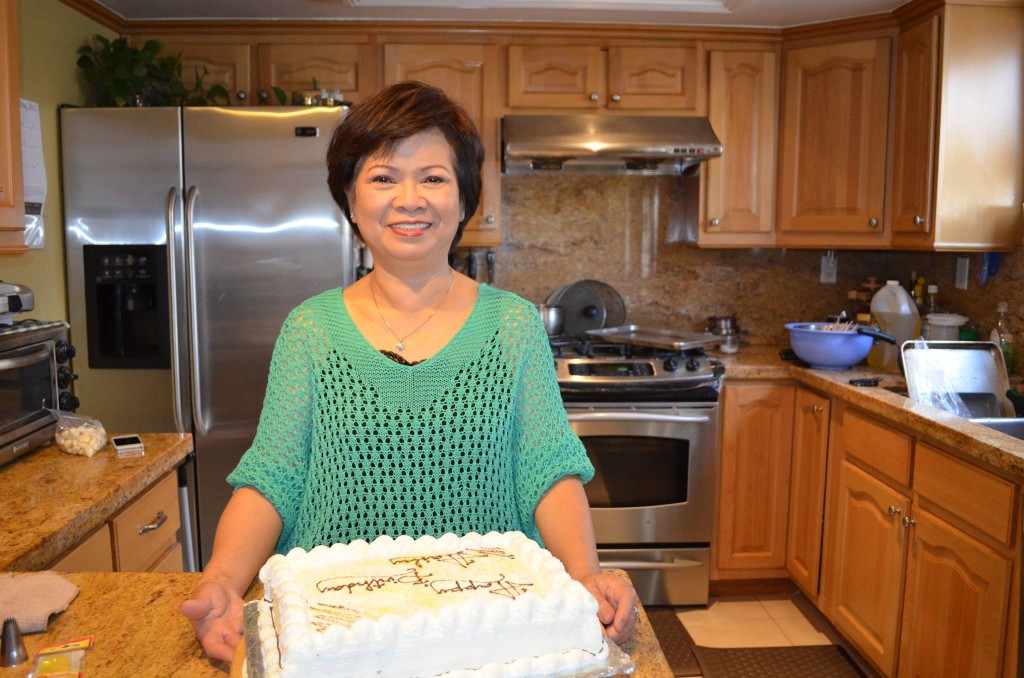
“I was allowed sitting near the boat’s door because I was pregnant at the time. The wheel was on the boat’s upper deck and I sat near that door. I then heard someone screaming that the boat was taking in water and that we were going to die. Someone pulled me out, and I had no idea how I could survive that. Even to this day, I would sometimes close my eyes and think back to that moment; and I still have no idea how I have survived it.”
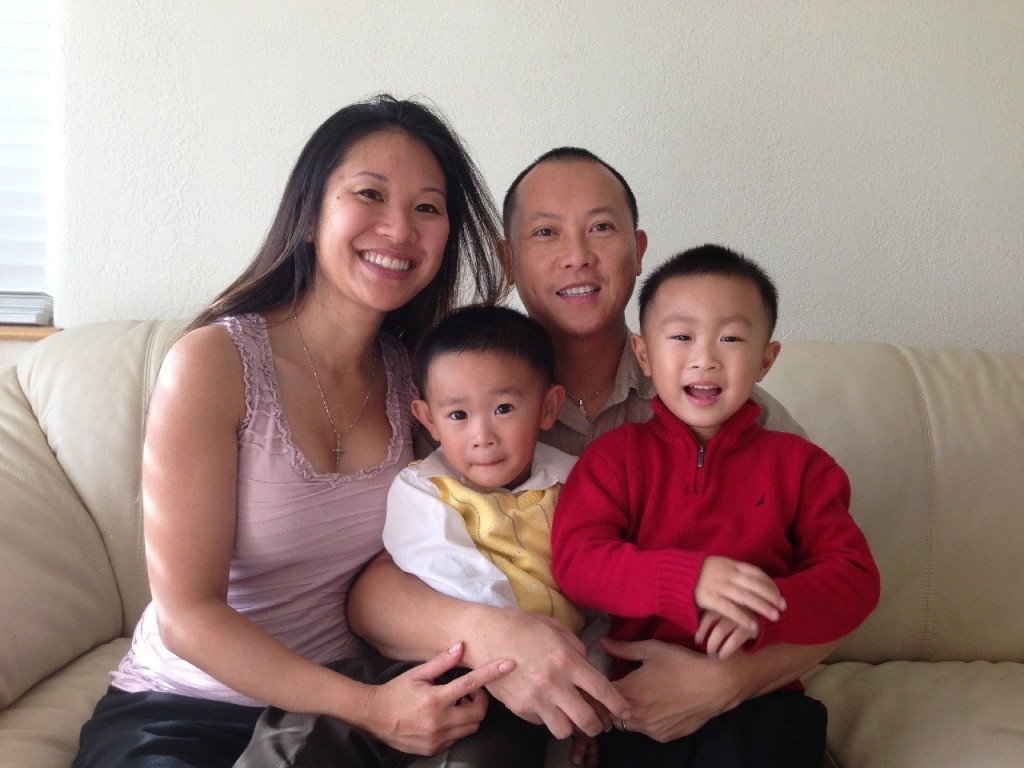
“One of my sisters was left back home. My mom was not planning to go because of the incoming storm. So when my dad was in a hurry to come pick them up, one of my sisters was sleeping and got left behind. We left our hometown and the storm did come, it was a miracle that we survived. It was so bad to the point where every one on board was crying and said that they wanted to go back home. But you see for the people who were standing around and just jumped on board, if we turn around they can just run off.Bbut for the person who did the planning, my dad, he would get beat up pretty bad and have to do 2 years in jail. So we headed on. ”
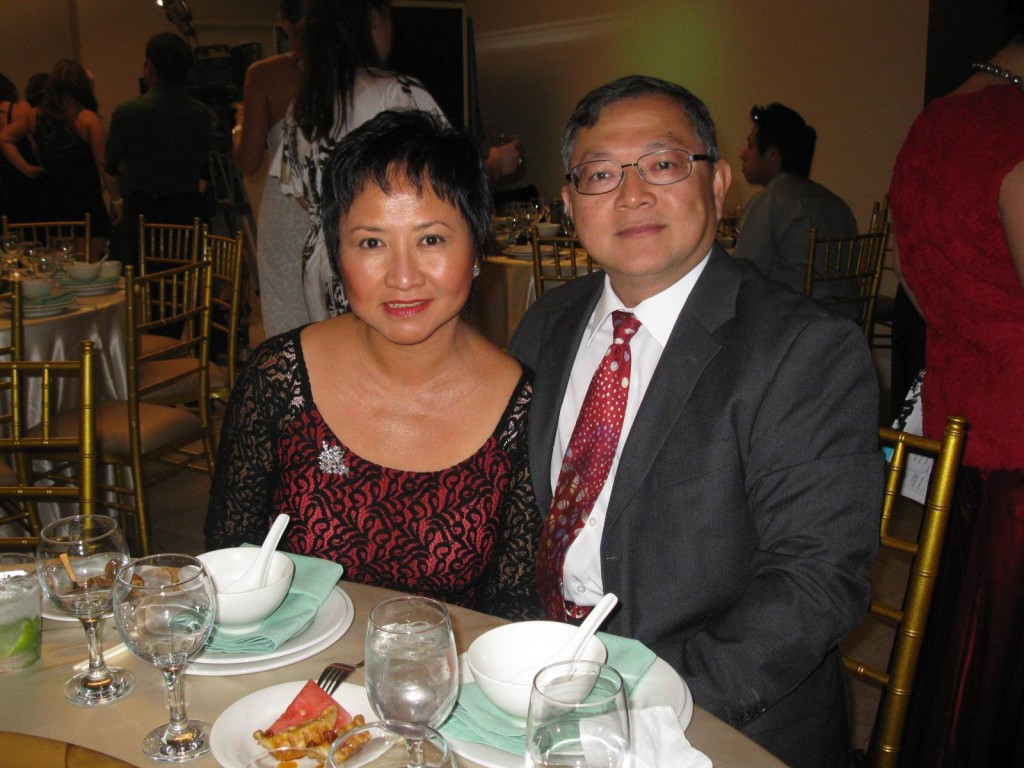
“At first I probably didn’t want to go to United States. In Vietnam in 1975, I had a scholarship to go to a French school for medical school. Unfortunately I couldn’t do it because the war ended in 1975 and the communist took over. The communist didn’t even let me go. When I came to the Camp I met with the French interviewers, I showed him and told him about my scholarship and he said he would check then come back to let me know. I waited for two months and didn’t hear anything.”
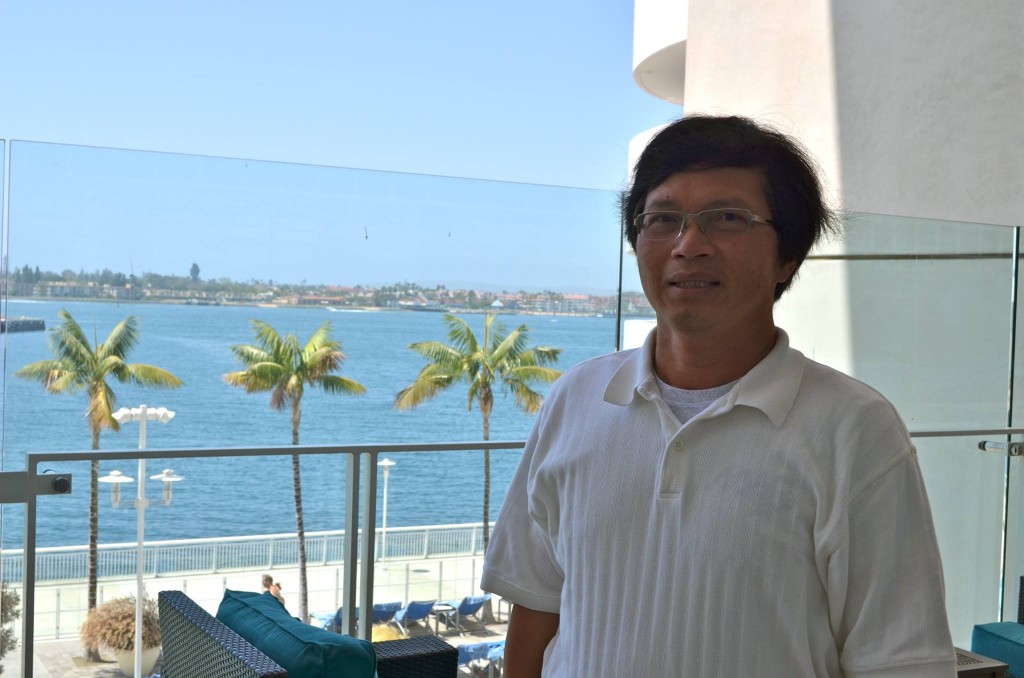
My life, the thing I want my children to understand is, the previous generation must work hard, study hard, to have a better life. My children should understand that the previous generations, must mature during the war and how that was like, how easy it was between life and death. At that time, life and death was considered as an everyday thing. Though I was afraid, it still occurs, so I don’t want to be afraid anymore.
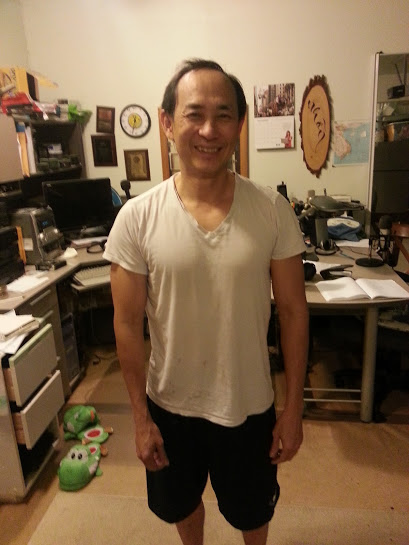
“When I came to the United States, I didn’t know how to speak English at all. All I did was speak French -but I don’t remember French now- … my cousin was 14 years old and my uncle said, “Why don’t you go to school with him?” And so I went to school with him. I started at the 8th grade and then I went to 9th grade, and yeah, I graduated when I was 21 years old. After I graduated, I joined the Marine Corp. The U.S. Marine Corp.”
– Bui Huy
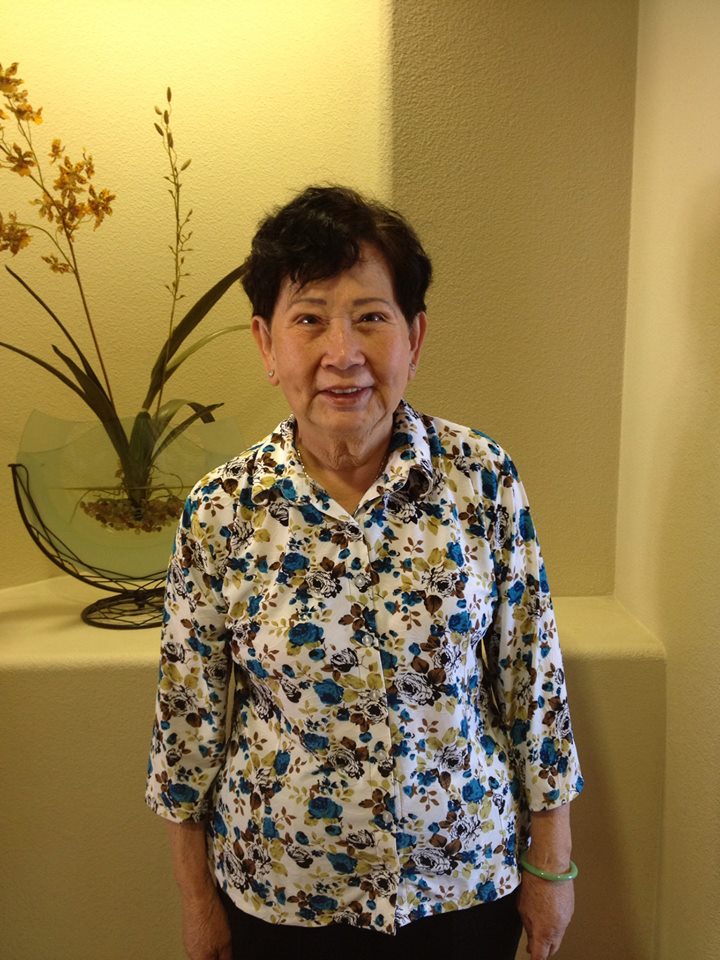
“It was me and my two daughters. When we got the England airport, the ladies told us that we have to go to school because we didn’t know any English. I only knew a little bit of English from high school. All I said was, “Yeah, yeah, yeah.” It was really funny. When we got to England, they were really good to us. They had church volunteers take us to the government place to get money because we were refugees. It was to help us with food and stuff.”
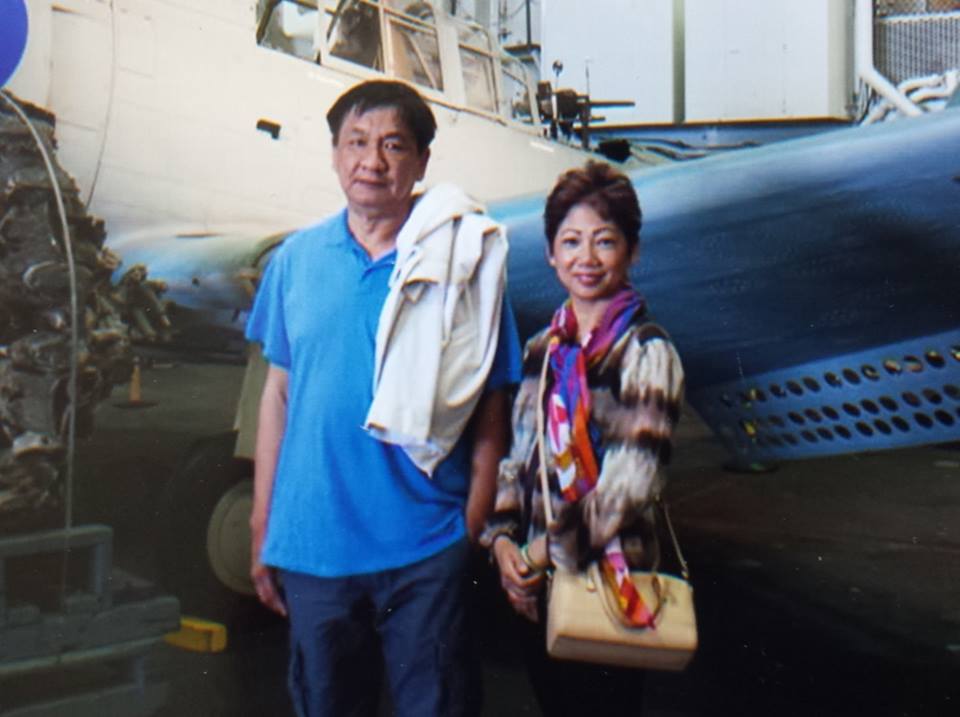
“At the time I went all by myself. There was only me. I had to live in a Malaysian refugee camp for almost 2 years. That was because I didn’t have priority status to get accepted by the American delegation. I didn’t have any relatives here so that’s why I had to wait so long. But in the end, I was extremely happy because I was able to come over, and that was what I really wanted.”

“The war affected my family a lot. During the war, we had to serve in the military. The tradition of Vietnamese people is to live together in the same house, but during the war, everybody had to live in a different city. Like me, I was 22 years old, and we had to work in the military, the Air Force, live far away from my house–about 500-600 miles. So every six months, I would take my vacation for about one week to go back to see my family. My mom and my sister were very sad about this because we all lived together when we were younger.”
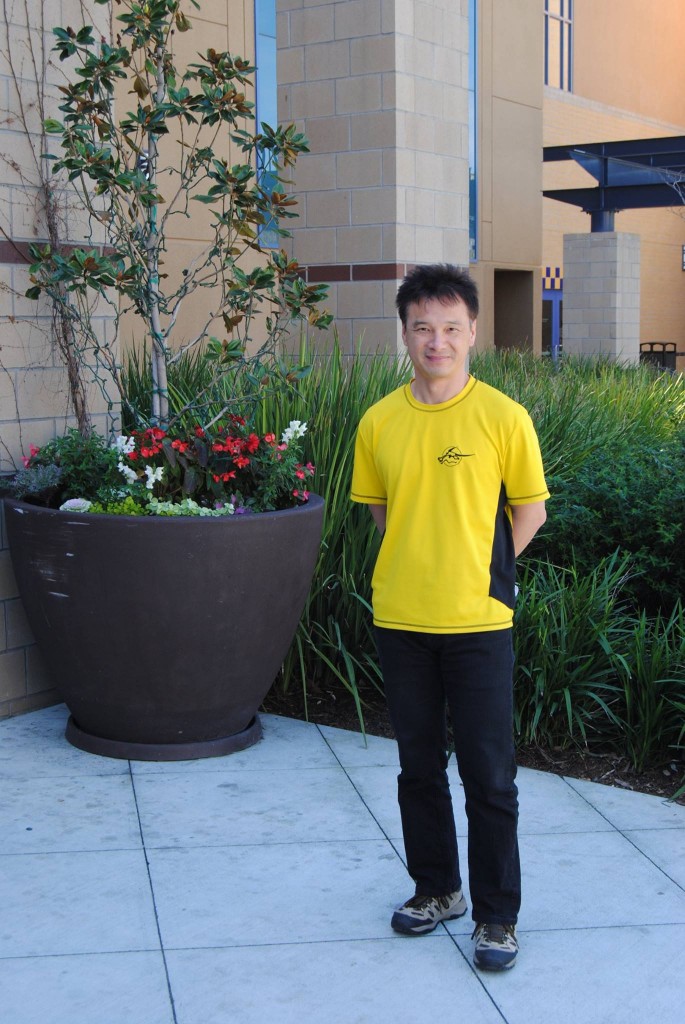
“My adoptive parents wanted to adopt me… because they lost an adopted child. During one of the flights that left Vietnam, it crashed. It was one of the many planes that left Vietnam. One of the flights crashed and there were about a couple hundreds of kids on the plane, and my mother, had an adoptive child on that plane and… it didn’t work out. I was not adopted yet when I came to the U.S.. But since she was working with that organization, FCVN, Friends of Children of Vietnam, she took the opportunity
to adopt me.”
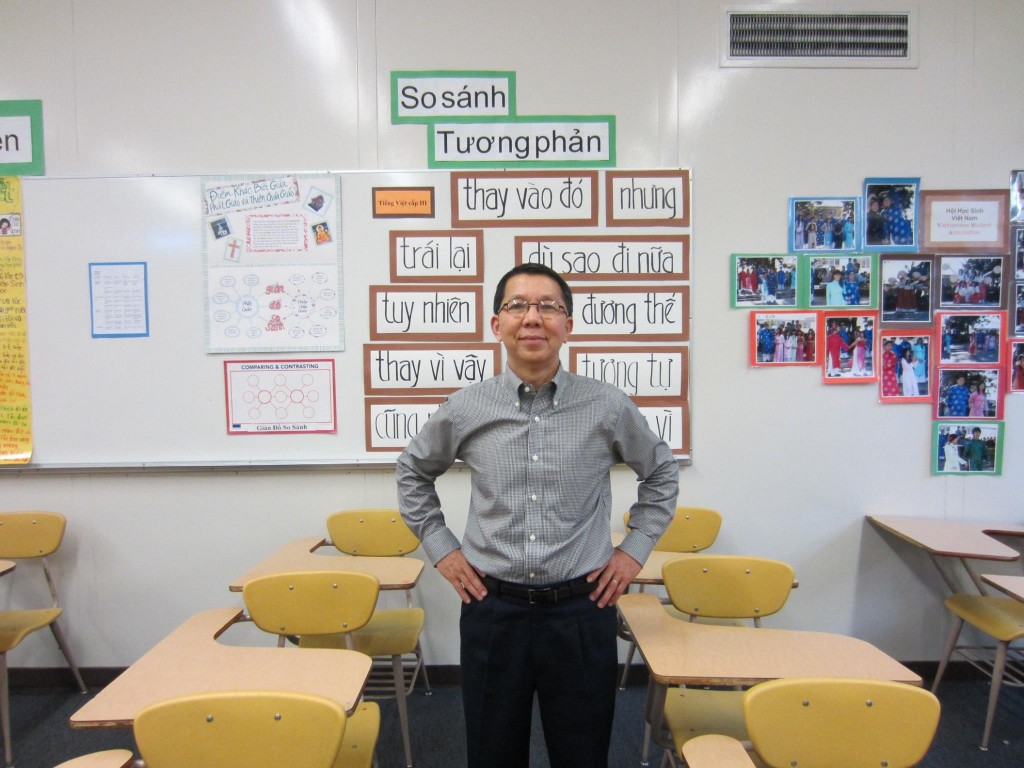
“It’s like I grew up without a childhood. I cherish my teenage years because war took everything good about my childhood away from me. We grew up in constant war, and we didn’t realize that at the time, we didn’t have what we should’ve as a young child. We didn’t have a chance to enjoy things that peace would give. We never had. We can’t travel out of the city to go see another place without thinking, “oh my god, what’s going to happen if I go there?” That’s one thing and it affected us in so many ways. Food was scarce and if you are not enlisted in the army, it’s hard to make a living in a city torn by war… in a country torn by war.”

“Except I was the last child of the family, a child of a woman who had no power in what is called the “rank” of my father’s wives. She was just a shadow in the household to help with miscellaneous chores and be a servant in the house. Therefore, I wasn’t brought up like my older sisters and brothers. Except for the fact that I was a lonely child in the household and was neglected, I was very happy. Because there were many people serving in the house, there were delicious foods. My mother was always around me because I was her only child, so she was attached to me. My childhood was relatively mixed with sadness and happiness, but I still have lots of happy memories.”
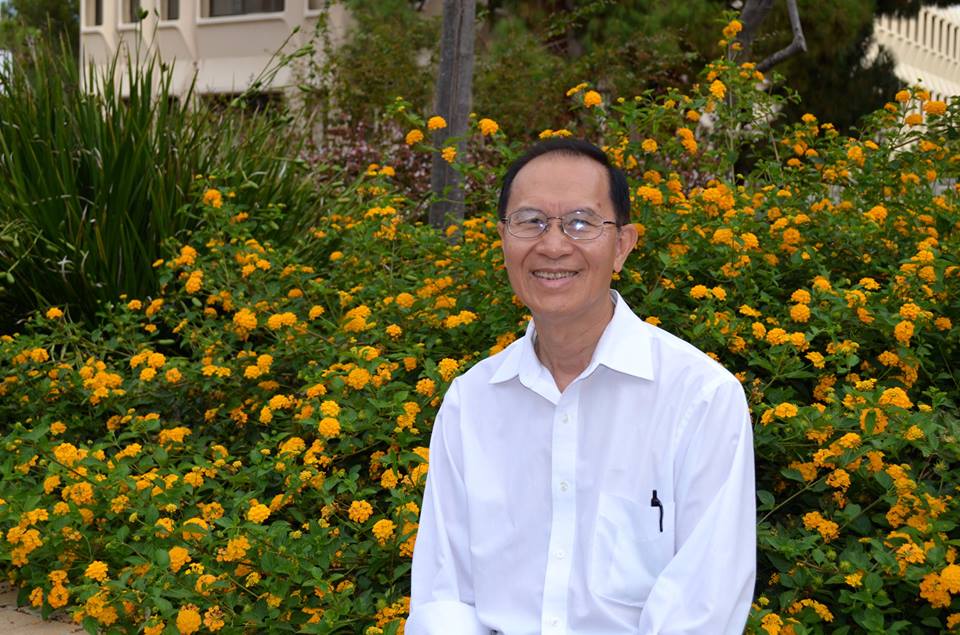
“I still feel apologetic towards my father. My father specialized in Oriental medicine. He mixed and made medicines. And I’m not just complimenting him because he’s my father, but I have to say that he was very good at curing people’s sickness, especially those who had asthma. His dream was that one of his children would enter the medical field when they grow up and be a pharmacist to create medicines from our family’s recipe. This method would be more civilized, scientific, and clean in order to popularize the [Oriental] medicines. That’s why he encouraged me to study pharmacy, but as soon as he passed away, I changed to literature.”
